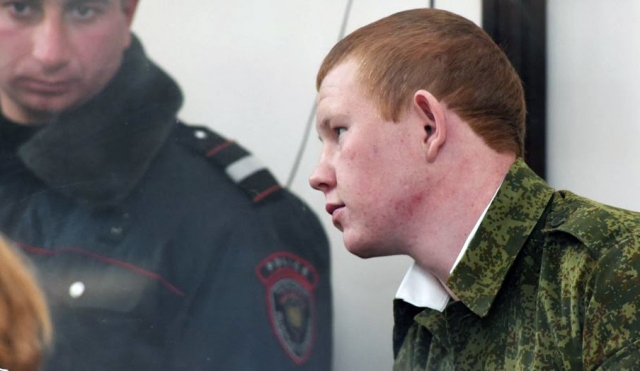Armenian Court Sentences Russian Soldier to Life in Prison for Murder
GYUMRI, Armenia – An Armenian court on Tuesday found Russian soldier Valery Permyakov guilty of murder and sentenced him to life in prison for the gruesome massacre of an entire family.
A Gyumri district court found Permyakov guilty of all charges that included murdering seven members of the Avetisyan family, breaking and entering, robbery and attempting to illegally cross the nearby closed border with Turkey.
On January 12, 2015, Permyakov repeatedly shot and stabbed seven members of the Avetisyan after forcing his way into their Gyumri home. Two of his victims included a 2-year-old girl and six-month-old boy.
The boy was seriously wounded in the attack and died of his injuries a week later.
Permyakov, who was based at the large 102ndRussian military garrison just outside Gyumri, immediately abandoned his post without leave and attempted to cross the closed border with Turkey after leaving his uniform and an automatic pistol at the crime scene.
Russian border guards later detained Permyakov in a village located on the Armenian-Turkish border and immediately handed him over to Moscow’s military officials in Gyumri.
While in custody, Permyakov confessed to the crime and said he’d forced his way into the Avetisyan’s home because he was thirsty.
A Russian military court found him guilty in August 2015 of desertion, theft and illegally carrying weapons in a civilian zone. The tribunal sentenced him to 10 years in a military prison but initially refused to hand him over to Armenian authorities to be tried for murder.
The court’s decision and the heavy-handed approach of Russian authorities and their refusal to turn Permyakov over to Armenian prosecutors sparked mass protests in Gyumri and the Armenian capital Yerevan, with thousands of protestors coming out against Moscow's military presence and deep-rooted political and economic influence in Armenia.
The multiple-homicide led to mass protests in Gyumri and the Armenian capital Yerevan against Russia's military presence in Armenia.
Russian authorities eventually turned Permyakov over to Armenian authorities to be tried for murder under Armenian law.
Their decision came after demonstrators demanded that Permyakov be tried for murder in an open Armenian court instead of by a Russian military tribunal’s closed court proceedings that guarantee immunity for the defendant from local prosecution.
Frayed Relations in Armenia's Hinterland
Located on a harsh, windswept plateau 120 kilometers north-west of the capital Yerevan, Gyumri is Armenia’s second largest city.
It has served as a Russian garrison town since the tsarist period. Known until 1992 as Leninakan, 60 per cent of the city was severely damaged by the December 1988 Spitak earthquake that killed up to 50,000 people.
The historic city of 125,000 people has suffered from high unemployment and widespread poverty since the dissolution of the Soviet Union and continues to harbor several thousand IDPs displaced by the earthquake more than a quarter century ago.
Russia’s military presence in the city is regarded as controversial. While Armenia is Moscow’s staunchest ally in the South Caucasus, opposition groups in Yerevan argue that the presence of a Russian base in Armenia serves an obstacle to Western investment and much-needed reforms in the country.
Armenian critics also charge that the presence of the base ties the country’s sovereignty and security too closely to the will of the Russian government and causes growing resentment among the local population as Russian military personnel repeatedly flaunt local laws and often terrorize the city’s residents.
The murder of the Avetisyan was only the latest deadly incident involving Russian servicemen in Gyumri.
In 1999, two drunken Russian soldiers armed with AK-74 automatic rifles went into the city and killed two men and injured 14 others.
The two suspects, Denis Popov and Alexander Kamenev, were originally tried in Armenia and sentenced to 15 years in prison. However, they were later handed over to Russian authorities after 24 months, repatriated and set free once they returned to Russia.
Public opinion in Armenia remains divided over whether to continue to allow Moscow to station thousands of troops along the country’s highly sensitive border with archrival Turkey.
A June 2015 poll in Armenia found that 55 per cent of respondents believes the presence of another state’s military bases in Armenia acceptable as a means of protection against Turkey and its close ally Azerbaijan.
By Nicholas Waller












